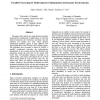Free Online Productivity Tools
i2Speak
i2Symbol
i2OCR
iTex2Img
iWeb2Print
iWeb2Shot
i2Type
iPdf2Split
iPdf2Merge
i2Bopomofo
i2Arabic
i2Style
i2Image
i2PDF
iLatex2Rtf
Sci2ools
187
click to vote
IPPS
2007
IEEE
2007
IEEE
Parallel Processing for Multi-objective Optimization in Dynamic Environments
This paper deals with the use of parallel processing for multi-objective optimization in applications in which the objective functions, the restrictions, and hence also the solutions can change over time. These dynamic optimization problems appear in quite different realworld applications with relevant socio-economic impact. The procedure here presented is based on PSFGA, a parallel evolutionary procedure for multi-objective optimization. It uses a master process that distributes the population among the processors in the system (that evolve their corresponding solutions according to an island model), and collects and adjusts the set of local Pareto fronts found by each processor (this way, the master also allows an implicit communication among islands). Moreover, the procedure exclusively uses nondominated individuals for the selection and variation, and maintains the diversity of the approximation to the Pareto front by using a strategy based on a crowding distance.
Distributed And Parallel Computing | IPPS 2007 | Multi-objective Optimization | Parallel Evolutionary Procedure | Pareto Front |
Related Content
| Added | 03 Jun 2010 |
| Updated | 03 Jun 2010 |
| Type | Conference |
| Year | 2007 |
| Where | IPPS |
| Authors | Mario Cámara, Julio Ortega, Francisco de Toro |
Comments (0)

